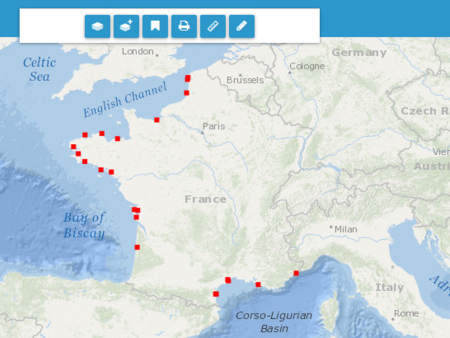Roscoff SOMLIT-Astan
Nom du lieu | Roscoff SOMLIT-Astan |
Code/Mnémo | tbc3 |
Département | 29-Finistère |
Laboratoire responsable | Station Biologique de Roscoff |
Contact | Fabienne Rigaut-Jalabert (jalabert@sb-roscoff.fr) |
Masse d’eau DCE | |
Latitude Longitude | 48.777777777778 -3.9375 |
Début de la série | 2000 |
Fréquence de suivi | |
Paramètres suivis | Température Salinité Oxygène Chlorophylle a Turbidité Nutriments : NH4+ ; NO3 + NO2 ; PO4- ; SiOH4 |
Proximité d'autres SNO | SOMLIT |
Commentaires | Depuis les années 2000, le Groupe Plancton (ECOMAP de l'UMR7144) et le Service Observation, de la Station Biologique de Roscoff, effectuent des suivis à long terme des populations phytoplanctoniques au point SOMLIT-Astan (Lat 48°46'40'' N, Long 3°56'15'' W). Cette station d'échantillonnage située à 2.8 miles nautiques de Roscoff, est caractérisée par une colonne d'eau de 60 mètres, non stratifiée, et ne subissant pas les influences continentales. Ce point est considéré comme étant représentatif des eaux de Manche Occidentale. Les populations de microphytoplancton, cellules phytoplanctoniques de tailles supérieures à 10µm, sont identifiées et comptées en microscopie optique. Les suivis de pico- et nano-phytoplancton, cellules phytoplanctoniques de tailles inférieures à 20µm, sont effectués en cytométrie en flux. Ces échantillonnages sont effectués deux fois par mois selon le calendrier des suivis du SNO SOMLIT (Service d'Observation en Milieu LITtoral). Depuis 2009, les suivis de pico- et nanophytoplancton sont intégrés aux paramètres du SNO SOMLIT. Les suivis de microphytoplancton sont intégrés au SNO PHYTOBS depuis 2018. |
Accès direct aux données | |
Bibliographie associée au lieu | |
Walde, M., Camplong, C., de Vargas, C., Baudoux, A.-C., Simon, N., 2023. Viral infection impacts the 3D subcellular structure of the abundant marine diatom Guinardia delicatula. Frontiers in Marine Science 9. https://doi.org/10.3389/fmars.2022.1034235 Caracciolo, M., Berney, C., Alric, B., Piredda, R., Zingone, A., Sarno, D., Percopo, I., Romac, S., Gall, F.L., Rigaut-Jalabert, F., Baudoux, A.-C., Simon, N., Henry, N., 2022. Insight into diatoms diversity at two European coastal sites (LTER-MC in the Mediterranean Sea and SOMLIT-Astan in the Western English Channel) using a DNA Metabarcoding approach. https://doi.org/10.1101/2022.07.01.498404 - Preprint BioRxiv Caracciolo, M., Rigaut‐Jalabert, F., Romac, S., Mahé, F., Forsans, S., Gac, J., Arsenieff, L., Manno, M., Chaffron, S., Cariou, T., Hoebeke, M., Bozec, Y., Goberville, E., Le Gall, F., Guilloux, L., Baudoux, A., de Vargas, C., Not, F., Thiébaut, E., Henry, N., Simon, N., 2022. Seasonal dynamics of marine protist communities in tidally mixed coastal waters. Molecular Ecology 31, 3761–3783. https://doi.org/10.1111/mec.16539 Arsenieff, L., Le Gall, F., Rigaut-Jalabert, F., Mahé, F., Sarno, D., Gouhier, L., Baudoux, A.-C., Simon, N., 2020. Diversity and dynamics of relevant nanoplanktonic diatoms in the Western English Channel. ISME J 14, 1966–1981. https://doi.org/10.1038/s41396-020-0659-6 Rombouts, I., Simon, N., Aubert, A., Cariou, T., Feunteun, E., Guérin, L., McQuatters-Gollop, A., Hoebeke, M., Rigaut-Jalabert. F., Artigas, LF. (2019). Changes in marine phytoplankton diversity: assessment under the Marine Strategy Framework Directive. J. Ecological indicators. 102 : 265-277 - https://doi.org/10.1016/j.ecolind.2019.02.009 Ramond. P., Sourisseau. M., Simon. N., Romac. S., Schmitt. S., Rigaut-Jalabert. F., Henry. N., de Vargas. C., Siano. R. (2019) Coupling between taxonomic and functional diversity in protistan coastal communities. Environmental Microbiology. 21(2) : 730-749 - https://doi.org/10.1111/1462-2920.14537 Arsenieff L, Simon N, Rigaut-Jalabert F, Le Gall F, Chaffron S, Corre E, Com E, Bigeard E and Baudoux A-C (2019) First Viruses Infecting the Marine Diatom Guinardia delicatula. Front. Microbiol. 9:3235. - https://doi.org/10.3389/fmicb.2018.03235 Siano R., Chapelle A., Antoine V., Michel-Guillou E., Rigaut-Jalabert F., Guillou L., Hégaret Helene, Leynaert Aude, Curd Amelia. 2018. Citizen participation in monitoring phytoplankton seawater discolorations . Marine Policy IN PRESS - https://doi.org/10.1016/j.marpol.2018.01.022 Baudoux A.-C., Lebredonchel H., Dehmer H., Latimier M., Edern R., Rigaut-Jalabert F., Ge P., Guillou L., Foulon E., Bozec Y., Cariou T., Desdevises Y., Derelle E., Grimsley N., Moreau H., Simon N. (2015) Interplay between, Micromonas cryptic species and their viruses in the Western English Channel. Environmental Microbiology Reports 7: 774:781 Guilloux L., Rigaut-Jalabert F., Jouenne F., Ristori S., Viprey M., Not F., Vaulot, D & Simon, N. 2013. An annotated checklist of Marine Phytoplankton taxa at the SOMLIT : Astan time series off Roscoff (Western Channel, France) : data collected from 2000 to 2010. Cah.Biol.Mar. 54. Foulon, E., Not, F., Jalabert, F., Cariou, T., Massana, R. & Simon, N. 2008. Ecological niche partitioning in the picoplanktonic green alga Micromonas pusilla : evidence from environmental surveys using phylogenetic probes. Environmental microbiology., 10(9), 2433-2443. Not, F., Valentin, K., Romari, K., Lovejoy, C., Massana, R., Töbe, K., Vaulot, D. & Medlin, L. 2007. Picobiliphytes, a new marine picoplanktonic algal group with unknown affinities to other eukaryotes. Science 315:252-254. Not, F., Latasa, M., Marie, D., Cariou, T., Vaulot, D. & Simon, N. 2004. A single species Micromonas pusilla (Prasinophyceae) dominates the eukaryotic picoplankton in the western English Channel. Applied and Environmental Microbiology 70:4064-4072. Romari, K. & Vaulot, D. 2004. Composition and temporal variability of picoeukaryote communities at a coastal site of the English Channel from 18S rDNA sequences. Limnology and Oceanography 49:784-798. Vaulot, D., Romari, K. & Not, F. 2002. Are autotrophs less diverse than heterotrophs in marine picoplankton? Trends in Microbiology 10:266-267. Sournia, A. & Birrien, J.-L. 1995. La série océanographique côtière de Roscoff (Manche Occidentale) de 1985 à 1992. Cahiers de Biologie Marine 36:1-8. Klein, B. & Sournia, A. 1987. A daily study of the diatom spring bloom at Roscoff (France) in 1985. II. Phytoplankton pigment composition studied by HPLC analysis. Marine Ecology - Progress Series 37:265-275. Sournia, A., Birrien, J.-L., Douville, J.-L., Klein, B. & Viollier, M. 1987. A daily study of the diatom spring bloom at Roscoff (France) in 1985. I. The spring bloom within the annual cycle. Estuarine, Coastal and Shelf Science 25:355-367. | |


